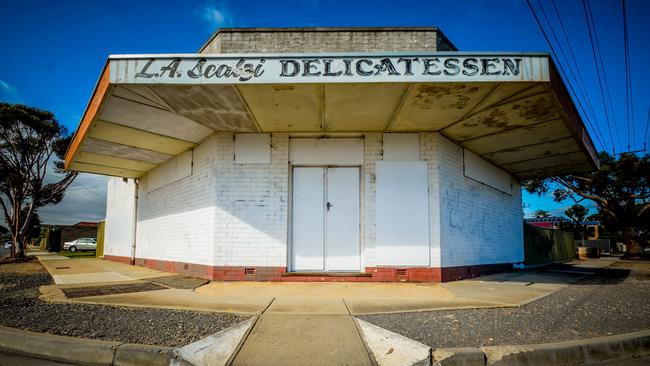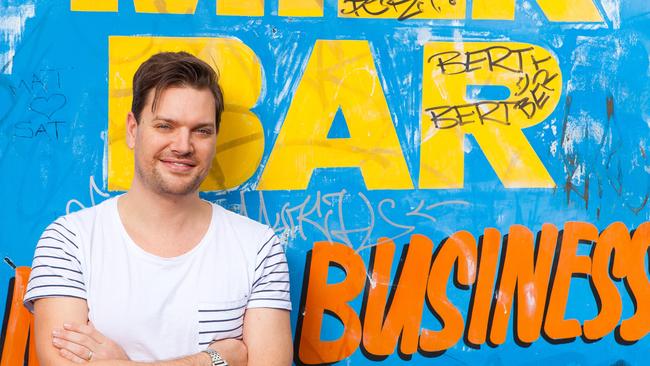The death of the Adelaide deli means the loss of so much more
One of life’s simple pleasures used to be dinkying a mate to the corner store to get a 20c bag of mixed lollies, bought with the money you earned washing cars — but the deli is dying. And supermarkets are to blame.
In Adelaide we call them corner stores, or delis. Elsewhere — in the sort of places where they eat devon instead of fritz — they call them milk bars.
But a deli by any other name would still smell like treats.
Musk sticks and lolly teeth, bananas without a molecule of fruit. Freckles and Wizz Fizz and Fads (the least politically correct lolly ever invented).
Some had hot chips, with chicken salt if you were lucky. Or the tang of vinegar, so the bottom chips and the bottom of the cup would be soggy.
The front would be plastered with newspaper ads, and inside you could pick up a tin of soup or bottle of milk, or a packet of Benson and Hedges Extra Mild (that happened more often, back then).
The humble corner store has been put up in lights in a book by Eamon Donnelly. The Milk Bars Book was a labour of love — Donnelly spent 15 years documenting the demise of the corner store.
It’s a coffee-table book, filled with pictures of stores and oozing nostalgia.
First published at the end of last year, it’s having a second wind as hipsters try to reinvent the Wagon Wheel by opening up their (overpriced) versions of the old corner stores.

Donnelly fondly describes his memories:
“Arriving at the shop, champing at the bit for a cool ice treat, punching through the rainbow plastic strips used to keep the blowies out, entering the shop and smelling the sweet musky aroma, I head straight to the counter to greet either Dave or Peggy. I begin the arduous task of choosing which sweet treat will part me with my copper coins. It’s a stinkin’ hot day so maybe it’s a Bubble O’Bill, an Eskimo Pie, a Heart, an Icy Pole, or perhaps an ice-cold milkshake whizzed up in a takeaway cup, one with malt, or a lime spider, or maybe a cool can of cola, or Fanta, decisions aplenty to be made.”
Happy times, but we know the ending.
Sunday trading, and convenience stores rang the knell.
In Adelaide, corner stores have been converted into houses. Some are still boarded up, waiting for their next incarnation.
The megastores are on the march — the Aldis, the Kauflands, and of course Coles and Woolworths.
Big, anonymous, hygienic places that you drive to. You don’t just “pop down” to a Costco.
Don’t worry, some in the food lobby say. There are still convenience stores. But they’re talking about the chain stores in the urban centres, or the Coles Express stores, or the 7-Elevens.
The sort of places where no one knows your name. And they won’t sell you a pack of B & H Extra Mild just because you’ve got a note from your Mum.

Professor Emma Baker, from the University of Adelaide, looks at the impact of housing and urban development on health.
She wonders whether — big supermarkets aside — the real replacement for the corner store is the servo.
“And you can never send your kid to the servo because they’re only designed for cars,” she said.
“It occupies the same position (as a corner store) but without the community glue.
“You have no lost dog posters.”
Corner stores, Prof Baker says, were part of the community. And they were a way that new arrivals to Australia brought in new foods, and found a place.
“With the servos — they all sell the same food,” she said.
She said that brought a change in the kind of food that we eat. At a corner store you might build your own double-cut roll or they would serve whatever the owner chose to cook. Now it’s a burger and a coke.
Then there’s the lack of walking. Everything is a car trip now.
Prof Baker points out that it’s not just the corner store that’s been stripped away from the community — it used to be common to walk to a bank branch, or a post office, but they too are dwindling.
Less walking is obviously bad for our health. But the loss of the local is worse than that. It means less connection in the community. Fewer hubs of people who look out for other people, who know each others’ names.
A recent article in The Conversation pointed out that as cities got bigger, people began to feel anonymous and isolated.
“Research has shown feelings of loneliness and social isolation are directly related to neighbourhood attachment and indirectly related to local amenities,” researchers wrote.
“We stand on busy trains, trams and buses every morning, surrounded by people, yet can feel very alone.”

That piece by Louise Grimmer from the Tasmanian School of Business and Economics at the University of Tasmania also points out that children often got their first taste of independence setting off for the shops alone.
She is optimistic, though, that the local store can be reinvented. She describes retro milkshake bars, or Instagram-driven shops that focus on local food, recycling, green credentials.
The question is whether people will form connections like they used to, gossiping over the lolly bar. Or if their attention will just flit from their smashed avocado to their smartphone.
This disconnection is a very real problem — governments, academics, and social researchers are talking about a loneliness epidemic.
Eight in 10 Australians think the world is becoming a lonelier place, and loneliness is now considered a risk factor for early death.
The Australian Medical Association has said having a Minister for Loneliness, or for Social Inclusion, is an idea with merit.
The Royal Australian College of General Practitioners is now hosting events alongside the recreational parkrun — not just because the 5km circuit is good exercise, but because it’s social.
Time will tell if a communal Saturday morning jog has the bonding power of dinkying a mate to a corner store then sharing a 20c bag of mixed lollies.

